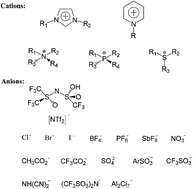Application of ionic liquids for liquid–liquid microextraction
Abstract
Because of their unique properties and good solubility for many different materials, ionic liquids (ILs) have been applied in all areas of the chemical industry. ILs' lack of volatility and flammability are the common characteristics that give them an advantage in various applications such as electrolytes in batteries, solvents and catalysts in synthesis, lubricants, solvents to manufacture functional materials, extraction, gas absorption agents, etc. The major purpose of this review paper is to provide an overview of the representative applications of ILs in liquid–liquid microextraction (LLME) techniques that benefit from the unique properties of ILs, including the developments achieved by combination of ILs with miniaturized approaches to sample preparation—namely, single drop microextraction (SDME), dispersive liquid–liquid microextraction (DLLME) and hollow fiber-based liquid phase microextraction (HF-LPME)—to improve both their sensitivity and selectivity. IL-based microextraction provides unique advantages, including low cost, simplicity of operation, speed, precision and accuracy, making ILs a powerful tool in chemical analysis.


 Please wait while we load your content...
Please wait while we load your content...